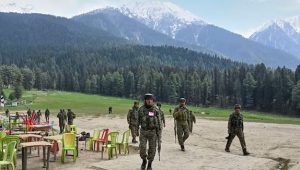No Friends Here

US President Donald Trump’s remarks that there have always been tensions between India and Pakistan and the two countries will figure it out between themselves “one way or the other” sends a very clear message to India, which, at present, is being goaded, by internal political pressure, to contemplate armed retaliation against its arch-rival Pakistan over the recent terror attack that claimed the lives of 26 tourists in Pahalgam, Kashmir.
“I am very close to India and I’m very close to Pakistan, as you know. And they’ve had that fight for 1,000 years in Kashmir. Kashmir has been going on for 1,000 years, probably longer than that. And it was a bad one yesterday, though, that was a bad one. Over 30 people,” Trump said during a press gaggle with reporters aboard Air Force One on the way to Rome. This very assertion that the US is equally close to both India and Pakistan lays bare the apparent failure of our foreign affairs apparatus, irrespective of the tall claims to the contrary and the constant declaration by India’s national television media that the POTUS is a “dear friend” of our Prime Minister. Moreover, three months into his presidency, Trump has yet to appoint an ambassador to India, indicating the low priority this country holds on his agenda.
For starters, the terror strike on civilians, that too tourists, was possible due to utter intelligence and security failure. About two thousand tourists were picnicking in the Baisaran meadow, touted as a Mini Switzerland in Pahalgam, and there was not a single jawan of Central forces or the state police in the vicinity. The Centre’s claim that the situation in the restive Kashmir Valley has become “normal” six years after the abrogation of Article 370 has perhaps led the administration into a state of complacency, leaving the unsuspecting tourists vulnerable to Islamist extremists. While most biased commentators are baying for Pakistan’s blood, none has questioned, as yet, about accountability of the Indian security system that failed to react instantly and minimize loss of lives. The nation would like to know who is responsible for the multiple failures and who is answerable.
The Pahalgam massacre, one of the many deadly terror attacks to have struck India in recent years, has led New Delhi to further downgrade its ties with Islamabad with a host of measures including cancellation of visa for Pakistan nationals, closing the Attari-Wagah border and keeping the Indus Water Treaty, which has survived three wars, in abeyance. The national mood, to some extent, has been whipped up in favour of harsh retaliation against Pakistan in terms of military intervention even as the Centre has not yet declared how it proposes to punish the perpetrators, backers and handlers of terror. Many observers are of the view that the Pahalgam terror attack could be a trap that Pakistan has laid for India. First and foremost could be to distract its own people from the economic and other hardship plaguing that country. Pakistan is probably in great economic crisis and is, as is usual for it, managing to stay afloat primarily due to bailout packages from China and some Gulf countries. Also, there is growing discontent among the masses towards the country’s all-powerful military. A war with India could change the national mood and unite all factions for a common cause.
Secondly, Pakistan has consistently leveraged the Kashmir issue as a political and ideological instrument. However, the recent attack in Pahalgam reveals a new aspect and that is the communal targeting of non-Muslims. The terror attack follows Pakistan army chief General Asim Munir’s comments referencing the Two-Nation Theory, which initially provided the rationale for the Partition of India based on religion. While anti-India rhetoric has long been a part of Pakistan’s military narrative, introducing a communal element is unusual.
Thirdly and most importantly, Pakistan may be acting at China’s behest to harm India’s interests. For, Beijing understands that a military conflict between Pakistan and India, even if a minor one, could damage India’s economy which is already facing a host of problems. If India is perceived as unstable or engaged in warfare, most international companies that are withdrawing from China due to the ongoing trade war with the US might refrain from investing in India. Many analysts see China taking advantage of the situation in which India currently finds itself.
It should be amply clear to any impartial observer that India is all alone in this fight against terrorism with no country, neighbor or otherwise, willing to support it militarily. Adding to the problem is that our ties with all our neighbors, not just Pakistan, have greatly deteriorated. This leaves a lot to ponder for India’s foreign policy makers because it is exactly their failure that has led this country to the present-day isolation and mess that it seems to have fallen into.
News